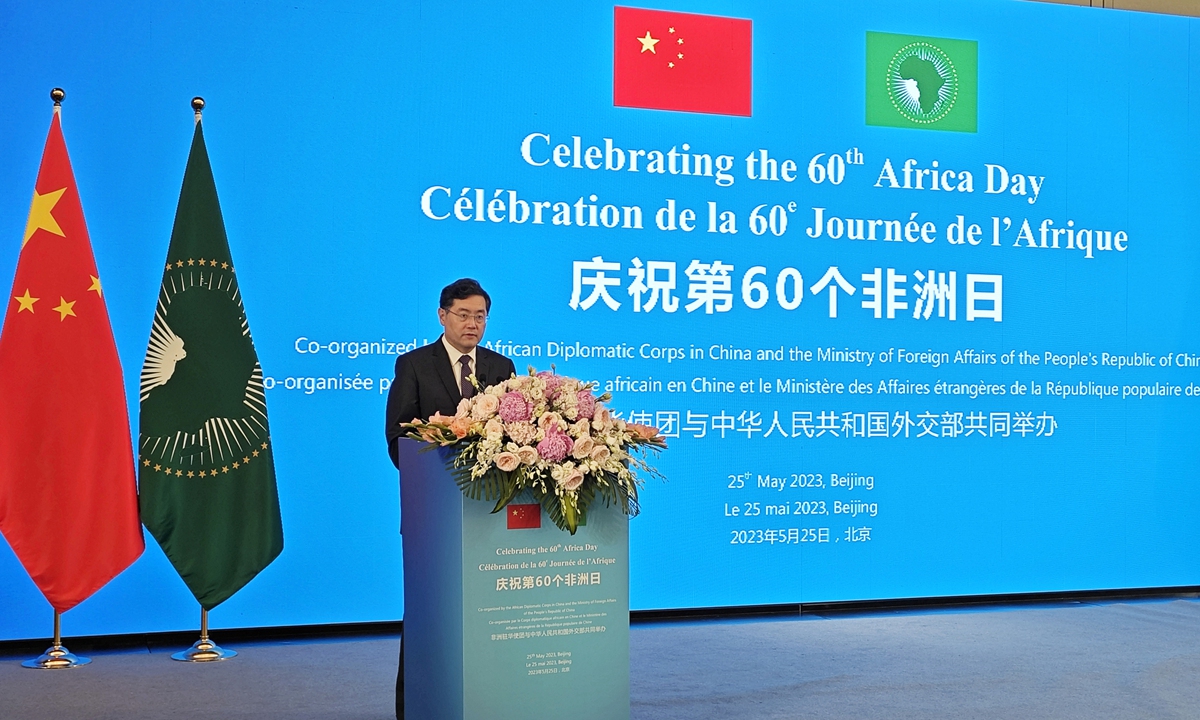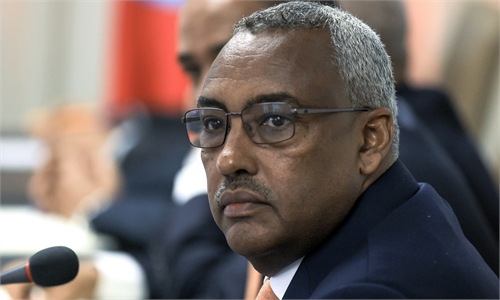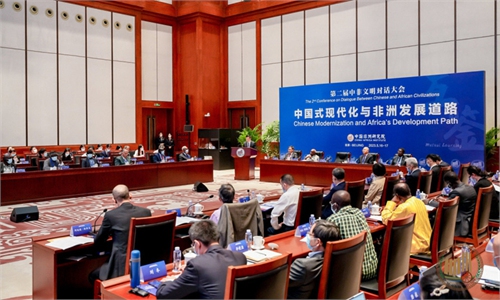Chinese and African govt officials refute debt-trap fabrication, vowing to strengthen solidarity, cooperation

Chinese State Councilor and Foreign Minister Qin Gang delivers a speech marking the 60th Africa Day celebration in Beijing on May 25, 2023. Photo: Yin Yeping/GT
Chinese and African government officials jointly refuted, on the occasion of the 60th Africa Day, the "debt trap" and "neo-colonization" claims fabricated by some Western media and politicians while vowing to strengthen solidarity and cooperation amid global challenges.
The statement, widely shared on the occasion of the celebration of the 60th Africa Day in Beijing on Thursday evening, sent a clear message to the world that China-Africa relations remain strong despite West's smears and this win-win cooperation has stood by itself as evidence for bringing prosperity to African countries, envoys and experts said.
In the opening speech delivered by the Chinese State Councilor and Foreign Minister Qin Gang on Thursday's celebration, he reviewed the fruitful relations between China and Africa in the past six decades while extending his expectations for stronger ties.
"Looking back on the past 60 years, it is the 60 years of China and Africa sharing weal and woe and helping each other," Qin said, noting that from striving for national liberation to exploring the path of modernization, from fighting Ebola to battle with the COVID-19, no matter how the international situation changes, China has always stood by Africa and has never been absent.
"The closer the China-Africa relations are, the more guaranteed the world peace is; the more successful China-Africa cooperation is, the more hopeful the world will develop," Qin said, noting that China and Africa have entered a new era of building a closer China-Africa community with a shared future.
Qin's remarks were shared by African government officials and envoys at Thursday's event.
Martin Mpana, Ambassador of Cameroon to China and Dean of the Group of African Ambassadors to China, said in his speech that the African ambassadors to China are very appreciative of the partnership developed between China and various African countries as well as regional bodies such as the African Union Commission on wide range of issues ranging from infrastructural development to public health, advocating peace and stability, as well as various financial assistance and support through bilateral cooperation.
Mpana in particular noted the mutual benefit for both China and the African nations participating in the Belt and Road Initiative (BRI) as it enters its 10th anniversary this year.
Africa-China Poverty Reduction and Development Conference, China-Africa Youth Gala and other activities have been held one after another, and the spirit of China-Africa friendship and cooperation has been continuously passed down on the vast land of China and Africa.
Moreover, China has been Africa's largest trading partner for 14 consecutive years. The two sides have jointly built more than 10,000 kilometers of railways and nearly 100,000 kilometers of roads. A large number of important infrastructures such as airports, docks, bridges, and power stations have also been completed and put into use.
The first and the longest electric transnational railway in Africa running between Djibouti and Addis Ababa, and other similar infrastructural projects in the continent have been playing a crucial role in speeding up regional connectivity.
China has had an increasingly constructive role in the continent's development, and up until this day, China continues to cooperate with African countries in tackling, under the spirit of mutual goodwill, the challenges of political instability, rising debt, poverty, infrastructure deficit.
Echoing these achievements, the Ambassador of Comoros to China Maoulana Charif said that China is one of the most important transforming partners that are supporting Africa's integration.
"We also commend China's support to African countries in achieving our continental Agenda 2063 and the UN Sustainable Development Goals," Charif said.
While China-Africa relations are seeing accumulated fruition that's benefiting the sustainable development of the African countries, it has also fallen into an easy target for some Western politicians and media to put dirt on such solid relations.
Qin said that to maintain their hegemony, certain countries are not hesitated to provoke division and confrontation, and have fabricated lies and false narratives such as the so-called "debt trap," "neo-colonialism" to maliciously slander and obstruct China-Africa cooperation.
As the world's largest developing country and the continent with the most developing countries, China and Africa need to strengthen solidarity and cooperation more than ever, he noted.
Qin's remarks were shared by other African envoys at the celebration.
João Salvador dos Santos Neto, Ambassador of Angola to China, told the Global Times on Thursday that "we should not look at what some foreign media say, but look at the result - projects under the BRI have brought great changes to the development of Africa. This can be seen from the close relationship between many African countries and China."
"If you would ask the African countries' representatives here about relations between China and their countries, be sure that they will give you a very positive and valuable comment with appreciation," Ambassador of Algeria to China Hassane Rabehi, told the Global Times.
While there are doubts and challenges from the external world, Rabehi said that "we are all the time confident in the readiness of the Chinese government to solve our problems within the spirit of respect and understanding and win-win cooperation."
Charif also noted that China's positive contribution to supporting African countries in debt restructuring and cancellation through implementation of the G20's Debt Service Suspension Initiative and Common Framework remains very important.
Speaking on the expectations for stronger ties between China and Africa, experts said that in the post-epidemic era, African countries are facing difficulties in economic recovery and growth, as well as the urgent need for poverty reduction in which China can play a part.
"African countries are now facing stagnation and economic downturn, which means that Africa needs more development funds and China will continue to support Africa's development within its capacity as always, despite the pressure of external unilateralism, especially the slander of China-Africa cooperation," Song Wei, professor at the School of International Relations and Diplomacy, Beijing Foreign Studies University, told the Global Times on Friday.


